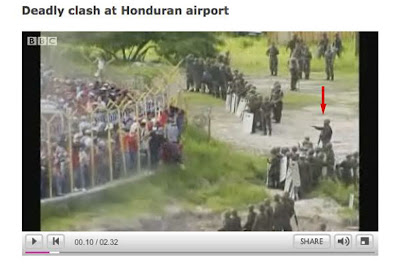http://www.venezuelanalysis.com/news/4598
Venezuela: US Must Clarify its Position on Honduras
July 7th 2009, by Kiraz Janicke - Venezuelanalysis.com
Speaking on behalf of Venezuelan President Hugo Chavez's United Socialist Party of Venezuela (PSUV) on Monday, former Venezuelan interior minister, Ramón Rodríguez Chacín called on United States president Barack Obama to clarify his government's position on the coup d'etat in Honduras, in which democratically elected president, Manuel Zelaya was ousted on June 28.
"There must be a categorical pronouncement and concrete actions by Obama in rejection of this coup d'etat," Rodríguez Chacín insisted, because it is "clear this coup is being supported by the military establishment of the United States."
Rodríguez Chacín argued that the coup must be understood in the context of increasing global political confrontation and as something that represents an attempt to destroy the progressive advances in Latin America signified by the Bolivarian Alliance for the Peoples of Our Americas (ALBA)
ALBA is a bloc of nine countries, spearheaded by Venezuela, which aims to promote an alternative development model in the region to the neoliberal model imposed by the US, based on economic and social justice, fair trade and participatory democracy.
While condemnation of the military coup has been near universal, the response of the United States government has been slow. The initial statement from the White House did not denounce the coup or call for the reinstatement of Zelaya but rather called for "all political and social actors in Honduras to respect democratic norms, the rule of law and the tenets of the Inter-American Democratic Charter".
Although US President Barack Obama and Secretary of State Hilary Clinton have made statements condemning the ousting of Zelaya and calling for his return, the US State Department is yet to legally define the coup as a "coup."
A law passed by US congress forbids granting aid to any government that has come to power through a military coup. Under pressure from a united Latin America to reject the coup US State Department official Ian Kelly announced on July 2 that the US has "paused" economic aid "directly aiding the government" pending the outcome of its legal finding.
However, in a State Department press briefing on Monday, Kelly indicated that the majority of activities funded by the US would not be affected by the measure, including humanitarian aid and "democracy promotion" programs.
The US also continues to maintain diplomatic ties with the coup government of Roberto Micheletti, with US Ambassador to Honduras Hugo Florens remaining in Tegulcigalpa, the Honduran capital, in an official capacity.
The BBC in Spanish also reported today that the Honduran Ambassador to the US, Roberto Flores, originally appointed by Zelaya but now a supporter of the coup, continues to retain official diplomatic accreditation from the White House and official access to US diplomats, despite being fired by the legitimate president after the coup.
US State Department officials have admitted that they knew about the coup plans for several months, but claimed they were trying to promote dialogue.
In a report today, US-Venezuelan human rights lawyer, Eva Golinger, documented links between the U.S. Agency for International Development (USAID), which grants $49 million annually to Honduras, and International Republican Institute (IRI), considered to be the international branch of the U.S. Republican Party, with groups involved in the Honduran coup.
Another "damning piece of evidence linking the IRI to the coup," Golinger argues, is a slideshow presentation by Susan Zelaya-Fenner, assistant program officer at IRI, on March 20, 2009, discussing the ‘good governance' program in Honduras during which she joked, "Coups are thought to be so three decades ago, until now (laughs, audience laughs), again."
"The majority of the recipients of [US AID] in Honduras, which comes in the form of funding, training, resources, strategic advice, communications counseling, political party strengthening and leadership training, are organizations directly linked to the recent coup d'etat," Golinger pointed out.
The organizations include the National Anti-corruption Council, the Archbishop of Tegucigalpa, the Honduran Private Enterprise Council (COHEP), the Council of University Deans, the Confederation of Honduran Workers (CTH), the National Convergence Forum, the Chamber of Commerce (FEDECAMARA), the Association of Private Media (AMC), the Peace and Democracy Group and the student group Generación X Change.
"These organizations form part of a coalition self-titled "Unión Cívica Democrática de Honduras" (Civil Democratic Union of Honduras) that has publicly backed the coup against President Zelaya," Golinger's report continued.
An indication of the US role is the extremely close military relationship between Washington and the Honduran military, US political analyst Michael Parenti argued.
"The Honduran military is trained, advised, equipped, indoctrinated, and financed by the United States national security state. The generals would never have dared to move without tacit consent from the White House or the Pentagon and CIA," he said.
Although the US has suspended "joint military operations" it continues to maintain around 600 military personnel in the Soto Cano airbase about 50km from Tegulcigalpa.
A press statement by the Honduran National Congress on Monday announced that a delegation of "Leading members of the Honduran National Congress and private sector and former members of the Honduran Judiciary will hold a press conference in Washington, D.C., to speak on recent events in Honduras."
"The delegation will be traveling to Washington for several days of meetings with United States policymakers to clarify any misunderstandings about Honduras' constitutional process and to discuss next steps to ensure the preservation of the country's democratic institutions," the statement continued.
Ian Kelly responded, "we don't know about a delegation coming here. So this is - if the delegation is from this de facto regime, the State Department wouldn't meet with them."
In Zelaya's highest-level talks with US officials since the coup he met with Hilary Clinton today in Washington. Clinton announced that Costa Rica's president, Oscar Arias would mediate talks between Zelaya and the de facto government.
"We are supporting the efforts that the OAS [Organisation of American States] has made but we think there needs to be a specific mediator," the US secretary of state said.
Speaking earlier from Russia, Obama said, "America supports now the restoration of the democratically elected president of Honduras, even though he has strongly opposed American policies".
Venezuelan political analyst and former vice-president José Vicente Rangel argued that the contradictory response of the US administration reflected two political lines in Honduras - a public one coming from Obama and the White House and the other from "the political machinery that remains in tact from the Bush administration," which is being apllied through the US military personal and advisors based in Honduras.
















































































